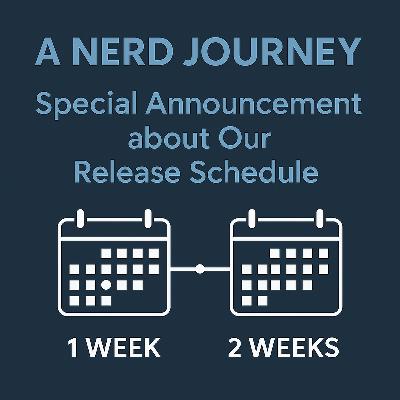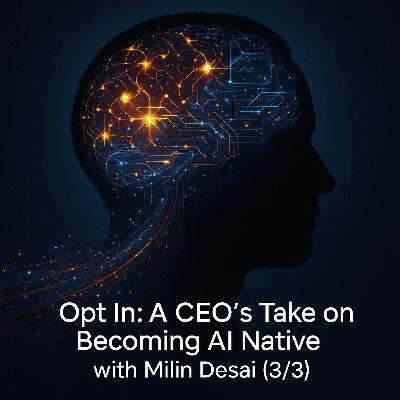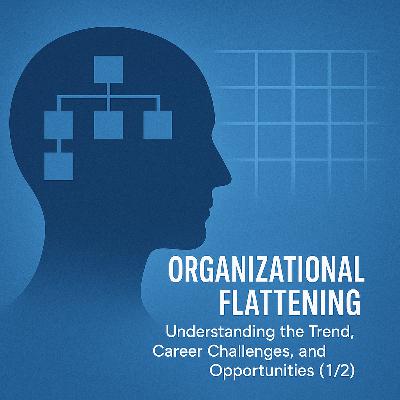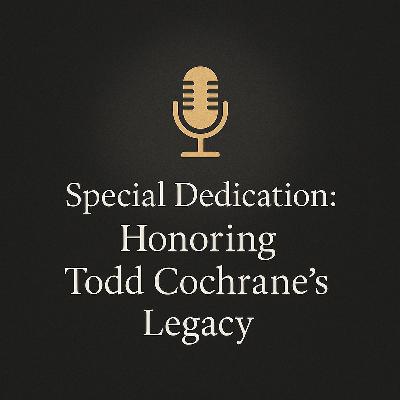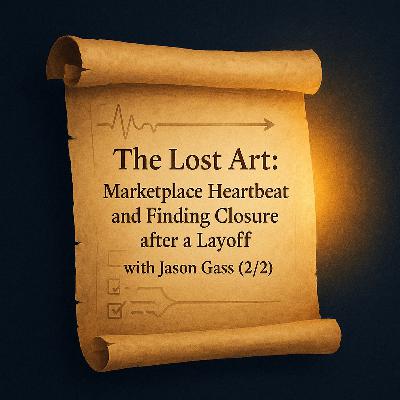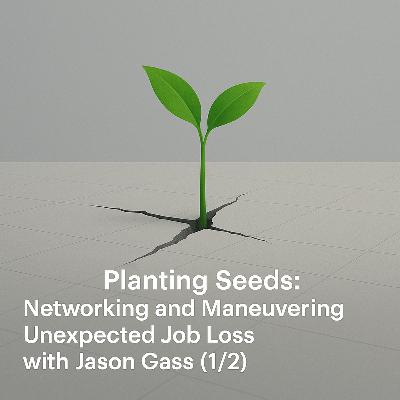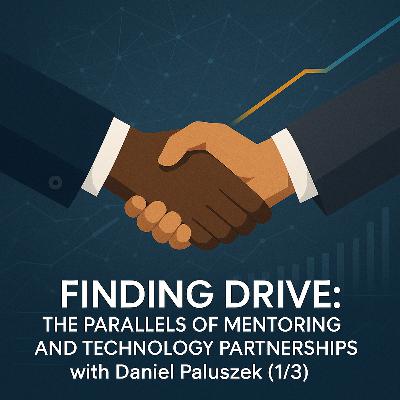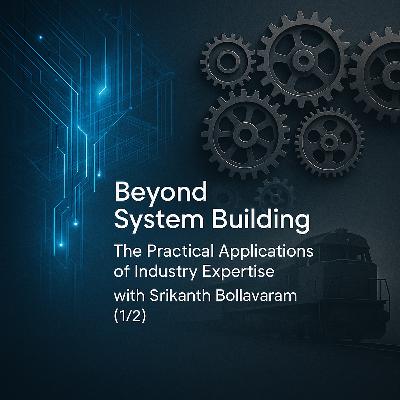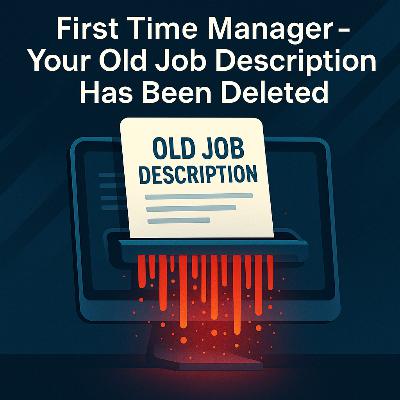Resume Damage: The Turbulence of Changing Job Levels and Finding a Mess to Clean Up with Paul Nadeau (2/2)
Description
Pursuing a role in leadership is one thing, but what happens when you try to return to life as an individual contributor? Our guest, Paul Nadeau, equates this experience to having “resume damage.”
Join us for episode 345 as we dive into the differences between pursuing a technical career path as an individual contributor and a career path in people management from a guest who has experienced both. Paul reveals a strategy for gaining expertise by sharing examples of his willingness to find and clean up a mess.
Through turbulent times in the tech industry, how can we give to our network with no agenda? Listen to Paul describe his approach to meeting new people, supporting them through layoffs, or just providing advice…all through merely having a conversation.
Original Recording Date: 08-28-2025
Topics – Technical Career Paths vs. Management Career Paths, Returning to Individual Contributor, Specialty Decisions, Nurturing Your Network and a Focus on Helping Others
3:15 – Technical Career Paths vs. Management Career Paths
- John mentions we have spoken on the show about the technical / individual contributor path to progression as well as the management career path.
- There is usually a path to stay an individual contributor in medium to large size organizations (i.e. the ability to progress to senior engineer, staff engineer, principal engineer, distinguished engineer, etc.).
- “If you want to progress in your career and you don’t have that path, management is not the natural thing to look at…unless you actually want to stop what you are doing and become a manager…. Becoming a manager does not make you…tech lead. It makes you manager. It’s a hard piece of advice to give somebody if they’re in an organization that does not have a next title, a next promotion for that person where they stay an individual contributor…. You shouldn’t try to become a manager. You should try to move organizations. That’s hard advice to give. I’ve had to do that a couple times.” – John White
- Paul recalls a conversation with his manager not long after the manager had been promoted into the position.
- “There’s no comparison between the management going up a chain of command and the engineer going up a chain of command. It’s a completely different skillset altogether….” – Paul Nadeau
- Paul tells us that as leaders progress to higher levels in an organization they take on more responsibility but also begin to manage a profit and loss center (or PNL). Rather than individual expense reports you’re looking at what the team is spending and what they are spending it on.
- The next level up is leading an entire division and considering how to distribute funds within your budget for salary raises, bonuses, or other types of compensation.
- Paul tells us that many leaders love to hand out promotions, but no one likes to fire people.
- When evaluating a technical career, Paul likes to think about the following:
- Am I having fun?
- Am I a benefit to the company?
- Where will I be a bigger benefit to the company…in my current role or in a management role?
- If applicable, are customers happy with me in my role (tech support, professional services, etc.)?
- “I think one of the big reasons why people leave companies is…whenever they say there’s no room for promotion; it doesn’t have anything to do with promotion into management. A lot of times they think that’s what it is. But it has to do with promotion of their brand, their career path. What are they doing, and how are they getting there? That’s what it has to do with.” – Paul Nadeau
- Management is a lot like herding cats, and according to Paul, not everyone is going to have fun doing that job.
- Paul has fun whiteboarding and providing technical solutions for his customers. This makes him happy.
- We have to define what success is for ourselves and not rely on how other people define success. Some people in technology define success as the level of management they have achieved.
- “Quite honestly, whenever somebody comes and says, ‘are you interested in management?’ Not really…because I can make a bigger impact here where I am now and I can go to club and make a lot of money getting there as a systems engineer…. In management…when you equate it all out, is it really as much fun? I don’t know. When you walk in and you go to dinner, nobody wants to sit with you because you’re the boss. Nobody comes to your table. Why not just be the fun individual contributor that’s the natural leader guy where everybody comes over to the table and you just kind of have fun doing what you do?” – Paul Nadeau
- Nick says Paul’s comments seem to hint at the importance of working for the right leader if you take on a role as a first-time people manager.
- Paul tells us it’s more than that. Managers have a ton of resources at their disposal, but their number 1 job is to protect the company above all else.
- “A lot of people say…I’m here to protect the people. No, you’re here to protect the company number 1. That’s why the company promoted you. The second thing is to protect your people. If you’re protecting the company you’re naturally protecting the people. Because now you don’t have a toxic work environment. You don’t have any kind of discord. You don’t have any kind of rule breakers. All that’s taken care of because you’re protecting the company first.” – Paul Nadeau
- One of a manager’s greatest resources is HR (Human Resources).
- “They are there as an advocate to help you as a manager to work through problems and issues. That should be your best friend in the whole world.” – Paul Nadeau, on HR
- Many leaders miss the opportunity to leverage HR as an advocate and helpful resource. One of the first things Paul did after becoming a leader was go make friends with his HR. He also highlights how communication with HR about more than just immediate problems can help (i.e., employees who are performing well that you want to retain).
- If you’re giving pointers to someone who wants to go into management or continue down that path, Paul tells us it’s not just about taking a class. You need an increased level of involvement with other people.
- Instead, do things to get involved in different user groups.
- Take on different roles that you can have fun doing.
- An increased overall level of involvement fosters strong relationships with different people. This is how to begin and continue building a professional network.
- As layoffs happen in the industry and people reign to move to different companies, the relationships can be retained.
- “These are still people. Humans first, right? That’s what it all boils down to…it’s still people dealing with people at the end of the day.” – Paul Nadeau
11:37 – Returning to Individual Contributor
- At some point after working in leadership, Paul chose to return to being an individual contributor. What went into that decision?
- “Actually, it’s harder to go backwards than it is to go forward. It’s harder to go from a management role into an individual contributor role.” – Paul Nadeau
- From the time Paul was promoted to director of worldwide services to his return to individual contributor was a span of about 8 years.
- Paul remembers a specific trip to Asia to spend time with a director under him and to attend to different organizational changes. It was 2 AM, and he received an unexpected phone call from a friend. Someone wanted Paul fired and wanted to take his job.
- Paul reminds us that at this time things were running smoothly. The services organization was making money ($48 million in the black). Employee morale was in great standing, and attrition was low.
- When he took over the services organization at this company after a massive restructuring years earlier, it was $18 million in the red, and the company was considering removing it completely.
- “The politics side of it…I’ve never done well with. I’ve never really done well with that. It is inherent. It is something that happens…. Human beings…we just naturally get political about things…. We have opinions…sometimes a little jaded opinions on somethings…or a little strong opinions…. And when the politics started to come out, I was like, ‘you know what? I’m not even cut out for this.’ And the worse it got, the less tolerance I had for it….” – Paul Nadeau
- Paul told his boss he wanted to move back to individual contributor again. Paul was ok with just being an individual contributor inside an organization he had built. He missed being in front of customers.
- “It is fun. It is rewarding to help people with their career and help them develop leadership skills that they didn’t know that they had, to see things in people that they don’t even know that they had and kind of help them evolve. However, there’s also the other side of it, which is, I can’t take this being up 17 hours a day, getting 3 or 4 hours of sleep a night, and being on airplanes all the time. It’s just taking a toll…. Everything considered, I want to go back to an individual contributor role.” – Paul Nadeau
- After talking through it together, Paul’s boss at the time was supportive of the move back to individual contributor.
- Paul also spoke to a really good friend who had progressed from individual contributor to being a peer of his in management about making the change back to being an individual contributor. At first that friend thought it wasn’t a good idea. It would remove some elements of compensation that were present at the leadership level.
- But, when the



